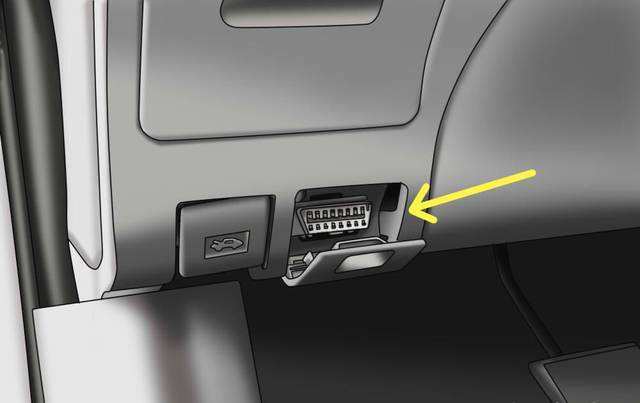GPS trackers come in three main types: hardwired, wireless, and OBD devices. While many are familiar with wired and wireless options, the OBD tracker deserves special attention for its unique features and ease of use.
An OBD GPS tracker is a type of tracking device that plugs directly into the OBD port of a vehicle.
This port is a standard feature in most modern vehicles, primarily used for diagnosing vehicle issues and accessing automotive data.
The OBD GPS tracker uses this connection to gather data from the vehicle’s onboard computer system.
It can track real-time location using GPS technology, and monitor various vehicle parameters like speed, fuel consumption, engine health, and even driving behaviors like harsh braking or rapid acceleration.
This data is often transmitted to a central server or accessible via software or mobile apps, allowing fleet managers or vehicle owners to monitor and analyze vehicle performance, usage, and location.
These trackers are widely used for fleet management, improving vehicle maintenance, enhancing driver safety, and providing valuable insights for optimizing operational efficiency.
Their plug-and-play nature makes them easy to install and use, offering a convenient solution for real-time vehicle monitoring and diagnostics.
In this article, we will explore the operational mechanisms and capabilities of the OBD GPS tracker, highlighting why it’s a preferred choice for many.
What Is an OBD Port?
OBD, short for On-Board Diagnostics, is a system integrated into vehicles. Initiated in the 1980s, many car manufacturers began incorporating OBD systems into their designs.
The more advanced OBD-II became standard in the 1990s, and by 1996, it was a mandatory feature for all vehicles sold in the U.S. market.
The primary function of OBD-II is to continuously monitor the vehicle’s exhaust gas treatment system, issuing alerts when it detects potential causes of excessive emissions.
This system also records fault information, aiding maintenance personnel in quickly identifying and addressing issues.
While OBD1 is directly connected to the vehicle’s console for diagnostics, OBD2 operates remotely, often using Bluetooth for data reading. This makes OBD2 more convenient for remote diagnostics.
In summary, OBD2 is an advancement over OBD1, offering better diagnostics, standardized codes, and remote connectivity, making it a more effective tool in modern vehicles.
OBD Tracker vs. Wired Tracker?
The OBD GPS Tracker and Wired GPS Tracker, while serving similar purposes, have distinct installation methods and features, each with its own set of pros and cons.
OBD GPS Tracker:
- Installation: Effortlessly plugs into the vehicle’s onboard diagnostic (OBD) port, offering a straightforward ‘plug and play’ setup.
- Advantages: OBD GPS trackers offer numerous benefits, including easy and cost-effective installation, along with providing valuable vehicle diagnostic data.
- Disadvantages:
- Its visible placement makes it susceptible to removal, posing a security risk, particularly against theft.
Wired Tracker:
- Installation: Typically installed behind the dashboard, connected to ignition, power, and ground wires.
- Advantages:
- Concealed installation makes it less obtrusive and more secure against tampering or theft.
- Versatile, suitable for various vehicle types, including private cars and trucks.
- Capable of collecting a broader range of data compared to some OBD devices.
- Disadvantages:
- Installation is more complex and often requires professional service, incurring additional costs.
- Not as easily accessible for quick installation or removal as OBD trackers.
Who Are OBD Trackers for?
The OBD (On-Board Diagnostics) GPS Tracker is a versatile tool, suitable for a variety of users and purposes:
-
Private Car Owners: Ideal for individuals who want a simple and effective way to track their vehicle’s location and monitor driving behaviors like speeding. Its plug-and-play design makes it user-friendly for everyday drivers.
-
Fleet Managers: OBD Trackers are invaluable for managing multiple vehicles in business settings. They provide real-time data on vehicle location, driving patterns, and can assist in optimizing fleet operations.
-
Logistics Companies: For businesses involved in logistics and transportation, OBD Trackers help in tracking cargo and ensuring timely deliveries. They also provide diagnostic data that can be crucial for maintaining vehicle health.
-
Parents of Teen Drivers: OBD Trackers can be a useful tool for parents wishing to monitor the driving habits of their teenage children for safety purposes.
-
Vehicle Maintenance Professionals: The diagnostic capabilities of some OBD Trackers can aid in identifying vehicle issues, making them a useful tool for routine maintenance and troubleshooting.
-
Rental Car Agencies: Rental businesses can use OBD Trackers to monitor their fleet’s location and usage, enhancing the security and efficiency of their service.




